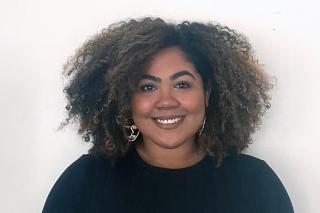Interview is edited for length and clarity.
Why did you consider Simmons for your college experience?
Before I decided to attend Simmons, I had applied to graduate schools and got accepted to many of them. I took a position as an Assistant Director of Admissions at Roger Williams University in Providence, Rhode Island, because I wanted to pursue higher education and enroll in a Roger Williams’ master’s program. Unfortunately, that was the same time that the COVID-19 pandemic was happening. I found it difficult to balance work and school so I eventually dropped it.
When I decided I was going back to graduate school, I wanted to be intentional about my decision. After my experience in higher education, I realized I wanted to further expand my education in gender studies, the same field I got my bachelor’s degree in. What I love about Simmons the most is how small it is. I went to a huge university for my undergraduate years and I got lost. With Simmons, the education was much more personalized.
How did attending a women-centered institution impact your studies?
It was perfect at a women-centered institution to learn about gender studies since the overall objective of the school is to be inclusive and empower women. What I did come to realize, too, is that the term “women-centered” doesn’t mean only women. The graduate programs are co-ed and I found it to be extremely inclusive. I met many individuals that identified outside of the two gender binary, which was really interesting, and I was able to learn from their experiences at a peer-to-peer level in the classroom.
Did you participate in any internships during graduate school?
Yes, in my second year, I applied for the Jennifer Eckert diversity, equity, and inclusion fellowship through Simmons University. My background in gender studies and how it relates to the real world made me feel prepared to take on the task of creating community conversations to talk about issues that might be uncomfortable.
The end goal was to hopefully have and facilitate a conversation between students and professors where students can speak honestly to professors about what their needs are outside of the academic part of their roles. We hosted events and I was able to gather information within my classes from students, so the conversations did happen.
Are you still in touch with other alumnae/i and professors?
Once I left Simmons, I did stick around. In my last year, I was a graduate assistant to Professor Saher Selod’s class and was her TA for “Social Inequalities.” The following year, she went on sabbatical and asked if I could step in for her to teach the class. I did and taught during the Spring of 2023, which was exciting and a dream come true.
I am still able to keep up connections with the professors who are still there. That is something I love so much more than in my undergraduate experience. Going to a large institution, I do not get reached out to as much by professors as I have at Simmons. I feel much more connected to my graduate school network.
What was one of your favorite courses? Why?
My favorite class was with Professor Saher Selod. It was about race, gender, and empire. What I loved so much about the class was how it built on my pre-existing understanding and gave me a more well-rounded view of the topic.
A lot of the time when I was pursuing sociology or gender studies classes, I rooted my understanding in my personal experiences and how my identity intersects with those systems. However, with this class, I was able to broaden my understanding outside of my own personal experience. I was challenged to see the intersection between our collective struggle and the identities of other people who are marginalized.
What advice would you give to students in the same master’s program?
Build a community. When I got lost in my undergraduate years, it was because there were so many things, and I think I’d do better in smaller settings. I went to a small high school, and then the opposite with a large higher education institution where I didn’t feel a sense of community. I was in a scholarship program, but I didn’t find my people just yet.
The way I found community was by getting involved. I was willing to meet people and attend events that I found interesting. In graduate school, the classes become more reading and writing intensive, so having a peer to learn from and collaborate with helps everyone interpret the readings and feel like they have friends as they move through the process.

